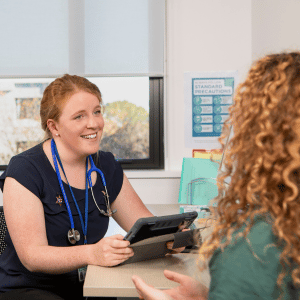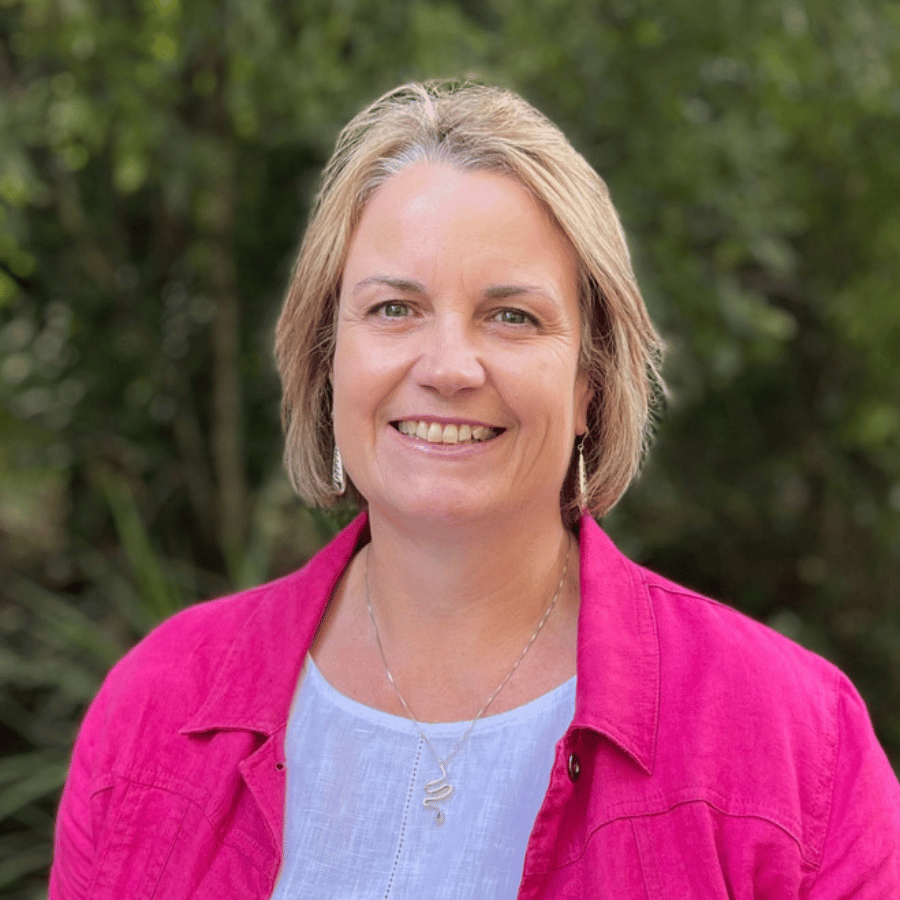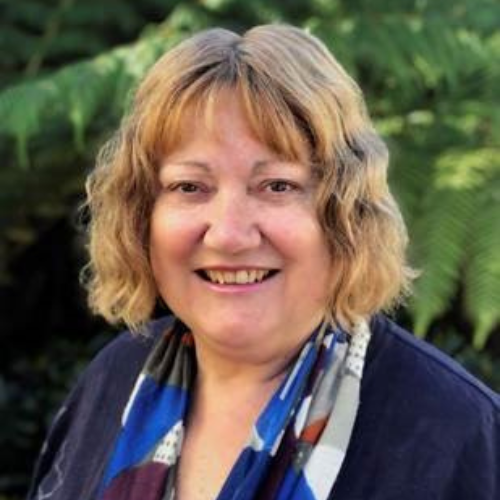Price
Domestic learners
$2,494* per 30 point course
*Fees outlined are based on the 2026 fee schedule and are subject to revision each year. Prices include GST where applicable. Non-tuition fees, such as the Student Services Levy (SSL), will also apply.
Qualification
MAdvNurs
240 points
Duration
4 years part-time
Learn online from anywhere in Aotearoa New Zealand, combined with up to 20 days onsite in Ōtautahi Christchurch.
Entry times
13 July 2026
February 2027
July 2027
2028
Overview
Expand your scope of practice and lead healthcare for individuals, whānau, and communities as a mātanga tapuhi | nurse practitioner.
Gain the credentials you need to make comprehensive assessments, generate diagnoses, and initiate interventions across public or private healthcare organisations. Through our postgraduate nursing degree, you'll build on your existing skills to promote health, prevent and treat disease, and improve access to healthcare, promoting health equity.
Through this flexible master's degree for nurses, you'll advance your knowledge and skills, formulating differential diagnoses to provide comprehensive health services. You'll develop autonomous practice and extend your career opportunities in the healthcare sector.
Learn online from anywhere in Aotearoa New Zealand, combined with up to 20 days onsite in Ōtautahi Christchurch.
Graduate with a Master of Advanced Nursing (Nurse Practitioner) and apply for registration with Te Kaunihere Tapuhi o Aotearoa | Nursing Council of New Zealand as a mātanga tapuhi | nurse practitioner, supporting positive health outcomes through advanced clinical expertise and excellence.
Find support through the Nurse Practitioner Training Support Scheme
You may be eligible for funding through the Nurse Practitioner Training Support Scheme (NPTSS).
Requirements
To ensure that our learners have the necessary background and experience to succeed, admission to the Master of Advanced Nursing (Nurse Practitioner) is based on your previous studies in a relevant nursing degree, and practical experience as a registered nurse. Applications from current registered nurse prescribers who have previously completed an approved qualification will be considered.
To enrol in the MAdvNurs, you must have:
- A current Registered Nurse practicing certificate from Te Kaunihere Tapuhi o Aotearoa | Nursing Council of New Zealand with at least three years of clinical experience; and
- Completed one of the following:
- Qualified for an Aotearoa New Zealand nursing degree with a grade average of B or greater in your 300-level (or equivalent) courses; or
- Completed a recognised nursing qualification requiring at least three years full-time tertiary study with a grade average of B or greater; or
- Successfully completed a qualifying course prescribed by the Amo Matua, Te Kaupeka Oranga | Executive Dean of Health or delegate; or
- Been admitted with Academic Equivalent Standing as fulfilling these requirements.
Your eligibility will be considered upon enrolment, with successful applicants approved as students by the Amo Matua Te Kaupeka Oranga | Executive Dean of Health or delegate.
Unsure about your suitability?
As part of our application process, your eligibility will be assessed by our nursing academic team to make sure that your academic and professional background meets the entry criteria. Unfortunately, our Tuihono UC | UC Online team cannot confirm your eligibility before your application is submitted, beyond referring you to the requirements above. We are happy to help answer any general questions you have about the programme or online learning, however. You can get in touch with us here.
For the full requirements, see the Regulations for the Master of Advanced Nursing (Nurse Practitioner) or use the admission requirements checker.
Clinical requirements
Clinical practicum requirements mean that learners must also complete at least 500 hours of placements in clinical settings. These practicum requirements include opportunities to integrate theory with diagnostic and clinical decision-making skills in complex health situations, allowing learners to develop advanced practice, leadership, collaborative and innovative clinical practice skills. Students must work with population groups across at least two settings, and practicum locations will be discussed during the enrolment process. We will need confirmation of your ability to access suitable clinical experience.
Course requirements
All courses are compulsory, and HLTH661, HLTH662 and HLTH663 must be successfully completed with at least a B grade average before studying HLTH673, HLTH692, NURS664 and NURS694. Learners must attend up to 20 days of in-person intensives at Te Whare Wānanga o Waitaha | University of Canterbury. Specific dates will be discussed during the enrolment process.
Structure
The Master of Advanced Nursing (Nurse Practitioner) comprises of five NZQF level 8 postgraduate courses, and two NZQF level 9 postgraduate courses, including 500 hours of approved clinical practicum.
It can be studied part-time over 4 years, subject to course availability. Learners must complete the MAdvNurs in the time frame stipulated by the Nursing Council of New Zealand to be eligible to apply for registration as a nurse practitioner: 48 months for part 1 (HLTH661, HLTH662, HLTH663 and NURS664) and 48 months for part 2 (HLTH673, HLTH692 and NURS694).
Time commitment
Part-time learners complete one course per semester, taking in course material, reflection time and writing assignments.
Learners must attend at least 500 hours of clinical practicum and up to 20 days of in-person intensives at Te Whare Wānanga o Waitaha | University of Canterbury. Specific dates will be discussed during the enrolment process, but include:
- HLTH662: 6 on-site days (3 sets of 2-days)
- NURS664: 2 on-site days
- NURS694: 12 on-site days (6 sets of 2-days)
Upcoming dates
Specific learning dates for this programme can be found below (please note: these dates exclude our two-week period of marking and feedback).
- 16 February – 21 June 2026
- Semester one study break and in-person intensives to be confirmed with enrolled learners
- 13 July – 8 November 2026 (please note: clinical practicum requirements may extend over the summer break)
- Semester two study break and in-person intensives to be confirmed with enrolled learners
Please note: these dates are provisional and may be subject to change.
Begin

Get started with the three foundation courses you need to begin your learning journey in advanced nursing.
Courses taken: Advanced Pathophysiology (HLTH661), Advanced Health Assessment (HLTH662) and Advanced Pharmacology (HLTH663).
Progress
Having successfully completed your foundation courses with a grade average of B or greater, take the next step in your learning through two advanced practice courses.
Alternatively, you may choose to exit early at this point. By completing the RN Prescribing Practicum course (including 150 hours of clinical practicum requirements) you can graduate with a Postgraduate Diploma in Nursing (Registered Prescriber).
Courses taken to progress your MAdvNurs (Nurse Practitioner): Advanced Professional Practice (HLTH673) and Evidence for Clinical Practice (HLTH692).
Course taken to graduate with a PGDipAdvNurs (Nurse Prescriber): RN Prescribing Practicum (NURS664).
Master
Finish your Master of Advanced Nursing through hands-on clinical practicum.
Successful completion of these courses means you can apply for registration with Te Kaunihere Tapuhi o Aotearoa | Nursing Council of New Zealand to work as a mātanga tapuhi | nurse practitioner!
Courses taken: RN Prescribing Practicum (NURS664), Nurse Practitioner Practicum (NURS694).
What you'll study
You’ll study five NZQF level 8 and two NZQF level 9 postgraduate courses for the Master of Advanced Nursing (Nurse Practitioner).
Description
This course will facilitate learners to demonstrate an advanced knowledge of the pathological basis and clinical manifestations of disease processes. This provides the foundation for clinical decision making related to assessment findings, investigations, and evidence to inform interventions and disease management.
Learning Outcomes
On completion of the course, it is expected that learners will be able to:
- Critically analyse the pathophysiological process of disease and health alterations.
- Critical interpretation of symptoms and clinical manifestations.
- Critically analyse the contribution of social and cultural determinants of health in relation to pathophysiology and clinical manifestations.
Description
This course will enable and prepare learners to utilise advanced knowledge of health assessment and diagnostic reasoning to formulate differential diagnoses and evidence-based plans and interventions. Learners will conduct holistic assessments, identifying current health issues, incorporating history, physical assessment, lifestyle, psychosocial factors, risks and potential complications.
Learning Outcomes
On completion of the course, it is expected that learners will be able to:
- Critically apply advanced health assessment and diagnostic reasoning principles.
- Critically analyse clinical assessment findings to generate diagnoses and differential diagnoses.
- Synthesise evidence-based practice to develop a therapeutic management plan.
- Critically apply a bicultural partnership approach to working with health consumers and whānau.
Description
This course facilitates learners to develop advanced knowledge in pharmacokinetics, pharmacodynamics, and pharmacogenetics for clinical practice. Studying pharmacology will equip learners with the knowledge and skills necessary to make informed decisions, assess risks and collaborate effectively in relation to prescribing practice. This foundation is crucial for delivering high quality, patient centered care and optimising outcomes for consumers.
Learning Outcomes
On completion of the course, it is expected that learners will be able to:
- Critically review the principles of pharmacokinetics, pharmacodynamics and pharmacogenetics.
- Critically review indications and contraindications, effects, adverse effects, drug interactions and client|whānau education associated with the use of prescription, Rongoā, Pacific healing health practice, over-the-counter and complementary medicines/remedies, and devices.
- Critically analyse and apply evidence-based practice to pharmacological interventions.
- Critically apply principles of equity to pharmacological practice.
- Explain the regulatory framework for pharmacological and other therapies within the Aotearoa | New Zealand context.
Description
In this course learners will critically examine the sociocultural and political influences on healthcare delivery in the context of advanced practice. This will include strategies to lead the improvement of the health and wellbeing of individuals, whānau and communities within a local, national, and global context.
Learning Outcomes
On completion of the course, it is expected that learners will be able to:
- Critically apply knowledge of leadership to advanced practice.
- Critically evaluate the cultural, social, and political environment in which healthcare is delivered within a local, national, and global context.
- Critically review and lead the advancement of healthcare that addresses inequities and promotes health outcomes.
- Critically evaluate the application of artificial intelligence and digital healthcare solutions in the delivery of care and advanced practice.
- Critically apply advanced knowledge of Māori health and socioeconomic disparities with a commitment to Te Tiriti o Waitangi.
Prerequisites: Advanced Pathophysiology (HLTH661), Advanced Health Assessment (HLTH662), and Advanced Pharmacology (HLTH663) with a grade average of at least B.
Description
Learners will develop a comprehensive understanding of the principles of evidence-based practice (EBP), reflecting the complex and multifaceted nature of clinical decision making, critical thinking and patient centered care. Knowledge of EBP is crucial for making informed decisions regarding patients and is foundational to the professional identity and competence of all health care practitioners.
Learning Outcomes
On completion of the course, it is expected that learners will be able to:
- Critically interpret evidence-based practice within the context of philosophical, theoretical, and social foundations of knowledge.
- Critically evaluate the ethical responsibilities when undertaking research in health and the application of findings in clinical practice.
- Examine approaches to research and clinical inquiry and how they inform evidence-based practice to inform decision making.
- Critically appraise the application of research findings and evidence-based concepts across diverse cultural contexts.
Prerequisites: Advanced Pathophysiology (HLTH661), Advanced Health Assessment (HLTH662), and Advanced Pharmacology (HLTH663) with a grade average of at least B.
Description
This course is for Registered Nurses who wish to become a Registered Nurse Prescriber with the Nursing Council of New Zealand | Te Kaunihera Tapuhi o Aotearoa. It includes theoretical and clinical components in an area of specialty practice within a collaborative team. Learners will focus on the application of evidence-based practice to inform prescribing decisions to meet the competencies for Registered Nurse prescribing practice.
Learning Outcomes
On completion of the course, it is expected that learners will be able to:
- Synthesise knowledge of advanced health assessment, pathophysiology and pharmacology in advanced clinical practice.
- Articulate and practice within the legal framework for Registered Nurse prescribing.
- Meets the Nursing Council of New Zealand (NCNZ) competencies for Registered Nurse.
Prerequisites: Advanced Pathophysiology (HLTH661), Advanced Health Assessment (HLTH662), Advanced Pharmacology (HLTH663), Advanced Professional Practice (HLTH673), and Evidence for Clinical Practice (HLTH692) with a grade average of at least B.
Description
This course will provide theoretical and clinical learning experiences for learners to meet the Nursing Council of New Zealand | Nursing Council of New Zealand | Te Kaunihera Tapuhi o Aotearoa competencies for Nurse Practitioner.
Learning Outcomes
On completion of the course, it is expected that learners will be able to:
- Demonstrates autonomous clinical decision making when working with health consumers, whānau and population groups with complex needs.
- Practices collaboratively with a multidisciplinary team to promote health outcomes and equity.
- Critically review conflicting evidence affecting clinical decision making.
- Demonstrates professional leadership across a range of healthcare settings.
- Critically reviews and contributes to the development of advanced practice knowledge.
- Meets the Nursing Council of New Zealand (NCNZ) competencies for Nurse Practitioner.
Prerequisites: Advanced Pathophysiology (HLTH661), Advanced Health Assessment (HLTH662), Advanced Pharmacology (HLTH663), Advanced Professional Practice (HLTH673), and Evidence for Clinical Practice (HLTH692) with a grade average of at least B.
Our people
The Master of Advanced Nursing (Nurse Practitioner) is coordinated by Senior Lecturer Melissa Hanses, with contributions from Nursing Clinical Coordinator Desma Christie, Associate Professor Cathy Andrew and other Te Whare Wānanga o Waitaha | University of Canterbury academics.

Melissa Hanses
Programme Coordinator | University of Canterbury
Melissa Hanses is a Senior Lecturer Above the Bar at Te Whare Wānanga o Waitaha | University of Canterbury (UC). She has over 25 years' of both clinical and teaching experience as a mātanga tapuhi | nurse practitioner.
Melissa’s clinical experience includes the areas of maternal special care/post-partum, neonatal special care, paediatric and adolescent healthcare, and urgent care across the lifespan. Melissa’s teaching focus is on post-graduate nursing education, specifically in the advanced practice nursing areas of RN prescribing and mātanga tapuhi | nurse practitioner pathways.

Desma Christie
Nursing Clinical Coordinator and Senior Clinical Educator | University of Canterbury
Desma is a Senior Clinical Educator at Te Whare Wānanga o Waitaha | University of Canterbury. She has over 32 years' clinical and education experience as a registered nurse.
Desma has a background in acute neuro nursing and has been teaching science based subjects such physiology and pharmacology for undergraduate and postgraduate nursing education for the past 15 years.

Associate Professor Cathy Andrew
Executive Dean, Health | Director of Nursing | University of Canterbury
Cathy Andrews' nursing practice background is ICU and mental health. She has many years of experience in nursing and health educational leadership and management. Her research includes numerous collaborative projects between education and practice including curriculum development, evaluation and innovation in educational delivery.
Cathy's career has spanned New Zealand, Australia, the UK and the South Pacific. She has served on advisory groups, panels and committees for groups such as Health Quality and Safety, Nursing Council of NZ, Vanuatu Qualifications Authority, NZ Qualifications Authority and the National Nurse Leaders group.
Stay updated
If you’re keen to know more, stay updated on when enrolments open or ask a question, please sign up for updates below.
Cap & minimum enrolment threshold: a minimum number of learners is needed for effective interaction and feedback, while a maximum cap of learners ensures high quality learning and support. If the minimum number of enrolments required for a course isn’t met, or the maximum cap is exceeded, learners will be given the option to defer their study or receive a refund.
FAQ
The Tuihono UC | UC Online Master of Advanced Nursing (Nurse Practitioner) is a 4-year (part-time) programme designed to develop advanced knowledge, skills and competencies to apply to become a mātanga tapuhi | nurse practitioner with Te Kaunihera Tapuhi o Aotearoa | Nursing Council of New Zealand.
Bringing together the latest industry-informed learning applicable to your life and career, the Tuihono UC | UC Online Master of Advanced Nursing (Nurse Practitioner) gives you the same quality education as other university programmes with the flexibility of online learning.
This includes 24/7 access, academic advice and technical support, giving you the support to study at your pace.
Graduates can apply to the Te Kaunihera Tapuhi o Aotearoa | Nursing Council of New Zealand for registration to practice as a mātanga tapuhi | nurse practitioner. They work as lead healthcare providers in partnership with health consumers and their whānau. Find out more here.
The overall cost of tuition fees per 30 point course based on the 2026 fee schedule:
- for domestic learners is $2,494* incl GST
Total programme investment for the 240 point programme based on the 2026 fee schedule:
- for domestic learners is $19,952* incl GST
*Please note that the fees are charged on a per year basis and the amount charged reflects the number of courses/points enrolled in the current year. These are based on the 2026 fee structure and subject to revision – you can learn more about the University of Canterbury’s Tuition fee structure here.
Student Services Levy costs
Each year university students around Aotearoa New Zealand are charged a Student Services Levy (SSL) in addition to their tuition fees. All the SSL money collected can only be used for the benefit of students - never for academic or administrative costs.
The SSL is automatically calculated on how many points you enrol in per academic year, capped at a maximum of 150 points. UC Online learners are charged a reduced SSL rate, which is 20% of the usual on-campus student levy. This is calculated as $2.06 per academic point in 2026. You can learn more about the Student Services Levy here, and more about UC Support Services here.
There are a range of options you can use to finance your study. We recommend a discussion with the postgraduate nursing education representative or team at your organisation to discuss your eligibility for health workforce funding and support.
Health New Zealand | Te Whatu Ora also offer registered nurse primary care scholarships. plus a database for other health scholarships.
We offer a range of Tuihono UC | UC Online scholarships, and Health New Zealand | Te Whatu Ora also offer registered nurse primary care scholarships. plus a database for other health scholarships.
We also recommend a discussion with the postgraduate nursing education representative or team at your organisation to discuss your eligibility for health workforce funding and support.
In addition, a range of other organisations also fund scholarships nz, which you can explore:
The programme can be completed in four years of part-time study, subject to course availability.
Studying online allows for flexibility in completing coursework, and Tuihono UC’s programme provides learners with the same quality education and resources as other university programmes.
Please note that this programme also requires in-person learning onsite at the University of Canterbury, and clinical practicum requirements.
The programme is delivered with a majority of coursework online, using a range of technologies including video conferencing, online discussion forums, and interactive learning experiences.
There are some intensive study blocks where learning will be onsite at the University of Canterbury (Ilam and Manawa (city) Campus).
Students must also complete at least 500 hours of clinical practicum requirements.
Learners have access to the same support services as on-campus students, including academic advising, technical support, and library resources. There are also great resources for both Canterbury based and remote learners at the UC RecCentre. Learn more here.
Learners also have the support of our Tuihono UC Learner Experience team.
Applications are made online through our Tuihono UC | UC Online website – view open enrolments and/or expressions of interest for when enrolments open.
Whether you need advice finding the right course for you or support with the enrolment process, we’re here to help! Contact enrolment support for course information, technical help and enrolment support.
There are some intensive study blocks where learning will be synchronous (live). Learners are expected to be present and participate in the online learning and the intensive study blocks onsite, as well as all clinical practicum requirements.
This degree equips you with all the competencies you need to apply for registration to practise as a mātanga tapuhi | nurse practitioner with Te Kaunihere Tapuhi o Aotearoa | Nursing Council of New Zealand.
The Master of Advanced Nursing (Nurse Practitioner) is a standalone, professionally relevant qualification.
If you are interested in a research career, you will require an individual assessment for entry to an on-campus PhD or DHSc programme. Alternatively, you may be interested in the on-campus Master of Health Science to undertake a dissertation of thesis.


